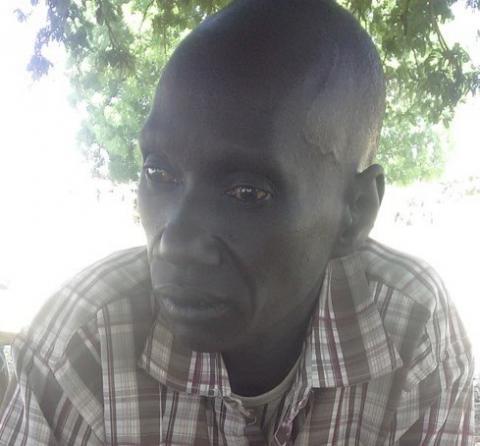$140 Cash Saves Lives and Prevents Split of Sightless Man’s Family in Peak Hunger Season
Aweil East, South Sudan - Save the Children “Cash Plus” interventions saves Wol Deng Kuol, a visually impaired man’s family. With the small cash injection, he is now able to pay school fees, take his children to hospital and buy food.

60-year-old Wol Deng Kuol father of three children (11, 9 & 7 years old) lost his sight in 2009 after continuous itching. He visited Khartoum for diagnosis and medication but the doctors failed to treat him. His wife died in 2011 while giving birth to their lastborn son who is 7 years old now. Kuol has had to take care of the family singlehandedly since then despite his impairment.
Save the Children’s South Sudan Joint Response 3 Project, gave Kuol and thousands of others unconditional 140 US Dollars cash support for four consecutive months complemented by one time emergency agricultural inputs provision consisting of crop seeds, 3 types of vegetable seeds and farming tools in June 2017.
The money helped Kuol to purchase staple sorghum, dry fish, groundnut paste and salt to cover food gaps for four months in the peak of the hunger seasons and medical fees expenses for treating malaria that affects members of his family. He also used the money to buy uniform, stationery and to pay school fees for his children in two rounds and hired laborers on his farming lands.
Kuol invested some of his money in Poultry - five layers and a broiler. His hens lay eggs that he sales to earn money and for household consumption. After covering all his expenditures, he has even tried to save the remaining balance but used later for getting medication to one of his girl who has been sick seriously, and also bought clothes for children during the recent Christmas.
He has used all the inputs provided to plant his own farmlands during the 2017 main cultivation season - June to October 2017. He planted half a feddan[1]s of sorghum and quarter feddan of groundnut. From his farming lands, he harvested 50 Kilograms of sorghum and 25 Kilograms of groundnut. Kuol also produced vegetables like tomato, Okra and eggplants that supported his family for two months.
He has acknowledged the Netherland donor and Save the Children for providing appropriate assistance that meet his immediate food needs in the peak hunger seasons. “if there were no supports provided, the consequences would have not been easy”, said Kuol adding the immediate impact would be family splitting as the children might go to Sudan seeking for labor work and also exposed to streets in towns.
“I would have been left alone with no assistance and even would die of starvation. Thanks to your (Save the Children’s) support, my family is with me, children are attending schools and the crops I planted will support my family in the next couple of months, he adds.
As per the IPC report January 2017, Aweil East has been identified as among the hot spot areas proposed for immediate emergency assistances. IPC’s projection for May to July 2017 has shown that 65% of the population were facing medium and severe food insecurity falling under the IPC 3 and IPC4 category. In addition to this, the SMART Survey conducted in June 2017 has shown that the malnutrition situation in Aweil East State was reported at rate of GAM 26.2% and SAM 4.1% which are above the emergency threshold.
The Netherlands Ministry of Foreign Affairs (MOFA), South Sudan Joint Response 3, funded project prioritizes to save lives and alleviate suffering of those most in need of assistance and protection, protect the rights and uphold the dignity of the most vulnerable in Aweil East for about a year, March - December 2017. More than 22,000 people benefitted from the project through cash plus interventions that combines of livelihood and WASH emergency interventions.”
By Gezahegn Eshete & Tito Justin |March, 2018
[1] Locally, a ‘Feddan’ of farming lands is equivalent to 0.4 hectares.
 South Sudan
South Sudan